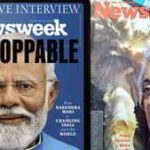1. What are your long-term career goals?
You can afford to make a bold statement here, but don’t go overboard. I know of a guy who said his goal was to take over the CEO’s job. As you can imagine, he didn’t get the job.
When you discuss long-term goals, don’t confine yourself to titles or a salary. Take a look at the company’s mission statement, consider your personal agenda, and craft a 1-2 sentence statement that combines them.
2. Tell us about your leadership experience.
There’s an important distinction to be made here: they want to know about your leadership experience, not your leadership roles. They already have your resume, so listing your leadership positions is redundant.
Think instead of a specific instance in which something good happened when you were a leader, even if the results weren’t measurable: “As the project lead on X, my coworker told me she always felt comfortable coming to me with questions.” Or, “As the project lead on X, we saw our social media engagement rates rise by 10%.”
3. Discuss your resume/work experience.
This is another vague request. You’ll want to make sure you avoid simply reading off a list of previous jobs. What I’ve found to be an effective strategy is finding an overarching theme and weaving in anecdotes from your experience into that theme.
For example, “The overarching theme of my experience has been taking the initiative. As an intern at X company, I was the first to [blank]. Then as a volunteer at Y I implemented [blank], and I’d like to continue that trend here.”
4. What are some achievements that you’re proud of?
No matter how much of a high achiever you are, you’ll need to go a step further in the interview by detailing how you’ve created value for someone other than yourself. Remember, you’re interviewing to be a team member.
Avoid mentioning classroom-related accomplishments like making the honor roll and instead focus on achievements that pertain to the specific job: “As a volunteer at X hospital, the patients I worked with reported high levels of patient satisfaction, which was incredibly rewarding.”
5. How do you deal with difficult or stressful situations?
Assuming you’ve discussed work-related matters for most of the interview, this is a window to include an anecdote about a personal struggle that you’re comfortable sharing.
Maybe you overcame an illness or juggled multiple jobs to make ends meet, but you made it through. Either way, make it clear that if you were able to handle this situation, you can handle anything your job throws at you.
6. What do you like to do outside of work?
All of these questions warrant authentic, transparent answers, but this one is especially important. This is your chance to prove your humanity. Hard work is important, but the ability to relax and transition smoothly into life outside the office is more valuable than you might think.
If you like to have a couple beers and watch football or go off the grid and watch birds, lay it all out there. To make it more conversational, tell a brief story that starts with, “Last weekend I…”
7. What can you offer that other candidates can’t?
This is tricky because you likely have no idea who these “other candidates” really are. You’ll need to be bold. In my experience, I’ve found that employers are most impressed when you make a guarantee.
A few years ago, I answered this question by saying, “I guarantee you won’t find another 20-year-old who reads about the history of advertising during their free time. And if they do, they don’t have as many pages of notes.” Imagine if I had just said, “I have a willingness to learn about the industry.” I’ll repeat: be bold.
8. What is our CEO/founder’s name?
There isn’t much explaining to do here. Study up.
9. How many tennis balls can you fit in a Boeing 747 airplane?
A friend of mine was asked this in an interview with an investment bank on Wall Street. When he told me about it, I couldn’t help but think how pointless it was. But then he pointed out that it wasn’t about tennis balls or airplanes at all. It wasn’t even about the right answer.
Your interviewer just wants to see how you use logic under pressure. This type of question may vary in details, but the important thing to remember is to calm down. The interviewer doesn’t know the answer either. Nor does he or she care.
10. What questions do you have for us?
You’ve reached the end of the interview and now you’re in the driver’s seat. Keep these questions direct and demonstrate that you’ve familiarized yourself with their organization. Here are some ideas (unless you already have some of your own):
- I noticed [insert something specific about their work], could you explain that in more detail?
- How will this role apply to your goal of [insert organization’s primary goal]?
- What are the biggest mistakes new hires make here?
- Have you ever had to work on an assignment that conflicted with your personal values?
21. If our company’s website was hacked and redirected all visitors to a scandalous foreign website, how would you handle the public relations crisis?
Ok, you probably won’t be asked that question, but I had the pleasure of answering that in an interview for an internship at a PR agency. I must have proposed a decent solution, because I got the job.
Hint: Actions speak louder than words, and furious customers don’t care about apologies on social media.














